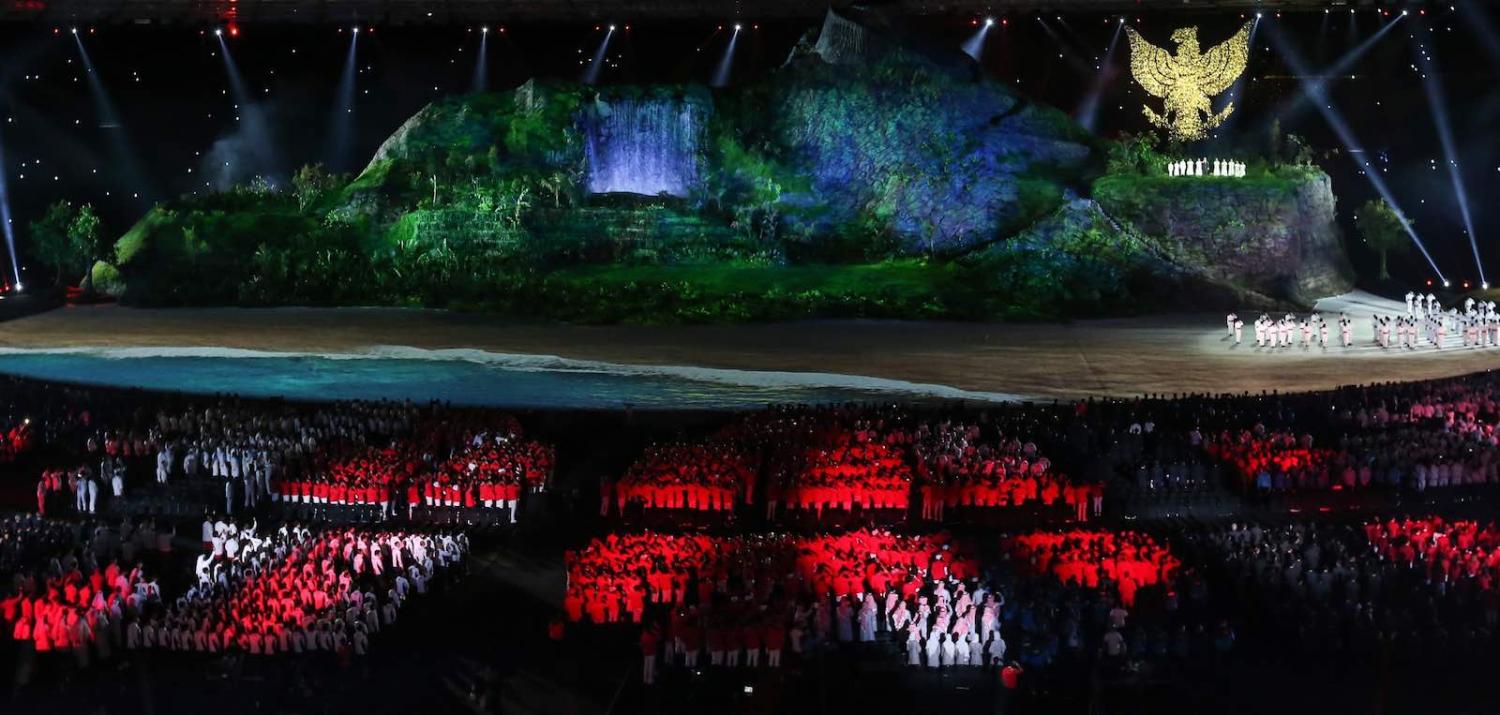While some may argue that sport and politics should never mix, many governments have perfected the art of the sport–politics cocktail. It has a name: sports diplomacy.
Countries such as Australia even have a “Sports Diplomacy Strategy” that explains how this heady concoction is meant to work. In the Australian Sports Diplomacy Strategy 2015-2018, produced by the Department of Foreign Affairs and Trade, sports diplomacy is described as:
an increasingly important aspect of diplomatic practice and a growing part of the global sports industry … The values of sport – competition, teamwork and fair play – help build trust between countries and bring people together.
Perhaps this was on the mind of the Indonesian government when it planned the opulent opening ceremony of the Asian Games 2018 at the weekend, held at the Gelora Bung Karno Stadium in Jakarta. It was a ceremony with everything: Indonesian President Joko “Jokowi” Widodo performing a motorbike stunt reminiscent of Queen Elizabeth jumping out of a helicopter at the London Olympics in 2012; a pyrotechnics extravaganza including a simulated erupting volcano; and choreographed dances, designed to promote the diversity of a country made up of some 17,000 islands.
The games will apparently cost an extraordinary US$356 million, but beyond the glitz and the glamour lurks a darker side. In recent months, the Indonesian government has rushed to spruce up the capital city of Jakarta and with its best efforts see the sports diplomacy bandwagon roll on. The games, after all, are projected to bring in $2.8 billion.
For a start, there was the $38,000 black net – purchased to cover the notorious Sentiong River. The governor of Jakarta, Anies Baswedan, explained the river is an eyesore and inconveniently runs adjacent the athletes’ dining hall. Yet plans to actually clean up the waterway, known locally as Kali Item or Black River, have been put off until the athletes go home. It isn’t even a metaphor for papering over the cracks to keep up appearances – it just is.
Then again, Indonesia is hardly alone in wanting to add a little shine to its efforts at sports diplomacy. There was the clear-out of homeless people on the Gold Coast in Australia before the 2018 Commonwealth Games, and the concealment of sex workers in London before the 2012 Olympics. But while many governments attempt to present themselves in the best light during a major sporting event, most don’t resort to gunning down local residents before the opening ceremony kicks off.
Yet according to human rights group Amnesty International, efforts to beautify Jakarta ahead of the games has seen 31 people shot dead by police as part of a crime crackdown – rather missing the point of sports diplomacy as a whole. But the controversy doesn’t end there. While the opening ceremony may indeed have been an ode to Indonesia’s national slogan, “Bhinneka Tunggal Ika”, or “Unity in Diversity”, and featured glorious set pieces such as a Ratoh Jaroe dance from Aceh, there were also glaring contradictions on display.
Sports diplomacy should not allow governments to hide their problems while ignoring reality.
At one point, the outside of the stadium appeared to be illuminated by the colours of the LGBTQ flag. What a powerful statement of inclusivity that would have been by the organisers, yet it seemed a hollow gesture. The games come just two weeks after Jokowi announced his running mate for the presidential elections in 2019 as conservative cleric Ma’ruf Amin – chairman of Indonesia’s top Muslim clerical body, the Indonesian Ulema Council (MUI) – who has described being gay as a “disorder” and called for members of the LGBTQ community to be jailed, caned or sentenced to death.
This is not to read too much into the ceremony. The very premise of sports diplomacy is that we should enjoy these kinds of events for what they are and the way they bring people together. They’re not meant to act as a salve to soothe the myriad social and political problems that Indonesia, like all countries, currently faces. So this leaves the question: why can’t we just enjoy the sparkle and the ensuing athletic prowess – if only for a while?
The problem, however, is that sports diplomacy should not allow governments to hide their problems while ignoring reality. Indonesia is currently gripped by rising religious intolerance, financial troubles, a spike in hate crimes, endemic corruption and widespread poverty, as well as the challenge of natural disasters, such as the recent series of earthquakes in Lombok.
There’s an argument that the $356 million could have been better spent elsewhere, and it remains to be seen how the projected $2.8 billion will benefit ordinary Indonesians – if at all. When it’s all over, the net across the Sentiong River will presumably be rolled up and the reality will be there for all to see.
Once the final firework has faded over the closing ceremony of the Asian Games 2018, you have to wonder when the real clean-up will begin.

